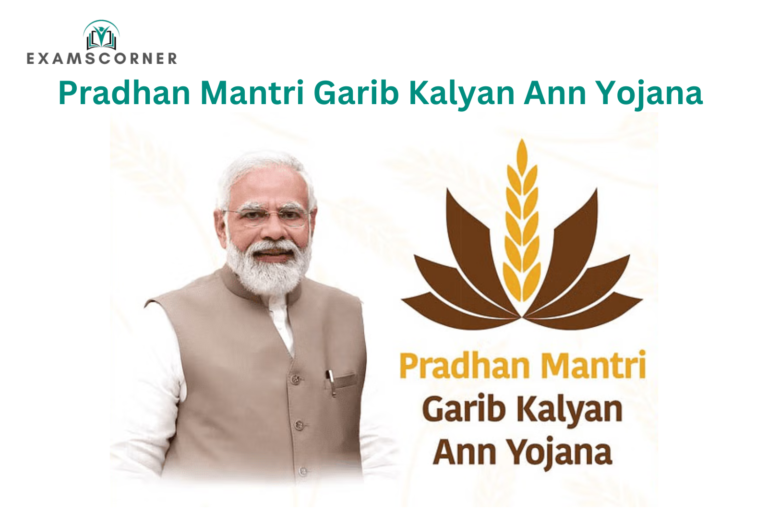The Indian government has extended the Pradhan Mantri Garib Kalyan Ann Yojana (PMGKAY), a flagship initiative under the National Food Security Act (NFSA), for another five years, effective from January 1, 2024. This extension aims to further strengthen the nation’s food and nutritional security, ensuring a steady supply of subsidized food grains to the eligible population.
Quick Facts about PMGKAY
- Purpose: To provide food and nutritional security to the Indian population, especially to the most vulnerable, through a human life-cycle approach.
- Type: Centrally sponsored scheme.
- Coverage: PMGKAY covers 67% of the country’s population, which includes 75% of rural and 50% of urban households.
- Identification of Households: Based on the National Sample Survey (NSS) Household Consumption Survey data for 2011-12.
Objective of PMGKAY
The scheme provides a legal right to eligible households to receive food grains at subsidized prices through the Targeted Public Distribution System (TPDS). The subsidized food grains are sold at Central Issue Prices (CIPs) under the PMGKAY initiative.

Salient Features of PMGKAY
The key feature of the PMGKAY is the provision of subsidized food grains to eligible households across India. The beneficiaries receive:
- Rice at Rs. 3 per kg.
- Wheat at Rs. 2 per kg.
- Coarse grains at Rs. 1 per kg.
Categories of Beneficiaries
- Primary Households (PHHs): Each member of the household is entitled to 5 kg of food grains per month.
- Antyodaya Anna Yojana (AAY) Households: These are the poorest families, and they are entitled to 35 kg of food grains per family per month. Additionally, AAY households receive 1 kg of sugar per family per month under the TPDS.The Central Government provides a subsidy of Rs. 18.50 per kg of sugar to AAY families participating in the scheme. States and Union Territories bear the distribution costs, which include margins for dealers, retailers, and transportation costs.
Life Cycle Approach and Benefits
PMGKAY adopts a life-cycle approach to ensure food and nutritional security, targeting the most vulnerable groups.
- Pregnant Women and Lactating Mothers (PW&LM) are entitled to maternity benefits of at least Rs. 6,000.
- Children aged between 6 months to 14 years are also covered to ensure nutritional support during critical growth years.
Food Security Allowance
In case of non-supply of entitled food grains or meals, beneficiaries are eligible to receive a Food Security Allowance to ensure continued access to nutrition.
Grievance Redressal Mechanism
A robust grievance redressal mechanism is in place at both the district and state levels. A penalty is imposed on public servants or authorities by the State Food Commission if they fail to comply with the relief recommended by the District Grievance Redressal Officer.
Women Empowerment through Ration Cards
To promote women’s empowerment, ration cards are issued in the name of the eldest woman of the household who is at least 18 years old.
Roles of Central and State Governments
The implementation of PMGKAY is a joint responsibility between the central and state governments:
- Centre’s Responsibility: The central government is responsible for the allocation and transportation of food grains, and providing assistance to states and Union Territories for the delivery of food grains from Food Corporation of India (FCI) godowns to Fair Price Shops (FPS).
- States’ Responsibility: States are tasked with the effective implementation of the scheme, including the identification of eligible households and issuance of ration cards.
Key Initiatives under PMGKAY
- Pradhan Mantri Garib Kalyan Ann Yojana (PMGKAY): This initiative provides free food grains to approximately 81.35 crore NFSA beneficiaries, including AAY households and PHH beneficiaries, for five years.Benefits: Free food grains ensure nutrition security for nearly 80 crore people across India.
- One Nation One Ration Card (ONORC): This scheme enables the nation-wide portability of ration cards issued under the NFSA. Beneficiaries can avail of food benefits through biometric or Aadhaar authentication, using the same ration card issued by their respective states or Union Territories.
- Pradhan Mantri Poshan Shakti Nirman (PM POSHAN): Launched for the period 2021-22 to 2025-26, PM POSHAN provides one hot cooked meal to children in Government and Government-aided schools. The beneficiaries include children from pre-schools (Bal Vatika) and classes I to VIII. This initiative is implemented by the Ministry of Education.
- Pradhan Mantri Matru Vandana Yojana (PMMVY): Launched in 2017 and later integrated into Mission Shakti (an umbrella scheme for the empowerment of women and children), PMMVY is a conditional cash transfer scheme for Pregnant Women and Lactating Mothers (PW&LM). It provides:
- A maternity benefit of ₹5,000 for the first living child.
- Institutional delivery incentives under Janani Suraksha Yojana (JSY), with a total benefit of approximately ₹6,000.
Conclusion
The Pradhan Mantri Garib Kalyan Ann Yojana (PMGKAY) is a crucial scheme aimed at ensuring food security for millions of vulnerable citizens across India. The government’s extension of the scheme for another five years, coupled with additional initiatives like One Nation One Ration Card and PM POSHAN, further strengthens India’s commitment to tackling hunger and malnutrition. Through these comprehensive and people-centric schemes, India continues to make strides toward achieving nutritional security for all its citizens.
For those who are eligible, these schemes offer substantial relief and are instrumental in improving the quality of life for millions of families in both rural and urban areas.



